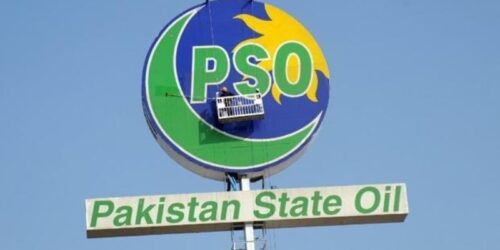State-run Pakistan State Oil (PSO) on Thursday got a better offer for Liquefied Natural Gas (LNG) from longtime friendly supplier Qatar Petroleum (QP) for delivery in the last week of current month at $15.93 per unit (22.13pc of Brent) that is still the highest-ever LNG price in the country.
While accepting the lowest bid among three others, the country’s largest company by revenue and biggest fuel supplier, confirmed the cargo for Aug 29-30 would be the most expensive so far.
“The highest slope PSO has paid was in February 2016 which was 18.93pc of Brent,” a company spokesperson said.
In a rare public statement following the fresh government instructions, the company said bid received for its re-tender “translates into $15.9271 per mmBtu (million British thermal unit) which is very competitive with current market rates.” It said PSO saved the national exchequer Rs2.1bn. It said the PSO decided to award the cargo to QP.
For a comparison, the Pakistan LNG Ltd (PLL) – the only other public sector LNG importer – had all the five spot cargoes booked for prices that ranged between $10.52 and $10.83 per unit for the current month.
A power sector operator said the LNG at 14pc and 16pc of Brent, LNG was expensive in producing electricity when compared with furnace oil and high speed diesel. When asked if the PSO had considered this aspect in accepting even the latest bid, the PSO spokesperson said “although PSO acts a buyer for SNGPL based on the Annual Development Plan (ADP)”, its Management Committee scrapped the earlier tender at $20.055 per unit which would have generated electricity at the rate of Rs22-23 per unit.
As such, PSO’s fresh bid is roughly Rs2.2bn above the PLL’s even though PSO want to claim Rs2.1bn saving over its cancelled cargo of $20 per mmBtu.
“Strangely, PSO is actually celebrating buying a cargo at $16, the highest price in Pakistan’s seven year in LNG business,” a former petroleum ministry official said.
PSO’s bid results showed four offers for tender it floated on July 29 for one LNG cargo delivery on Aug 29-30 window and one of them did not conform to bid evaluation criteria. Three others – Gunvor Singapore, Vitol and QP Trading offered their cargoes at 28.9876pc, 24.0386pc and 22.1311pc of Brent, respectively. These translate into $20.88, $17.33 and $15.9271 per per mmBtu, respectively.
In comparison, the company said on furnace oil electricity would have been generated in the range of Rs19-20 per unit. “On today’s awarded tender, the electricity generation cost would be Rs14-15 per unit”. Power generation cost on diesel is even higher than furnace oil in the range of Rs25-27 per kWh. According to Nepra, the fuel cost on HSD and furnace oil was Rs20 and Rs14.5per unit last month.
Commenting on its Rs2.2bn at the rate of $5 per unit higher than PLL’s price, PSO said the time of award was of the essence in spot market. PLL’s tender opened on July 28 for the first week of September delivery, which is closer to PSO’s delivery of Aug 29-30 also fetched a price of $15.3970 per mmBtu (excluding port charges of 20 cents per mmBtu) which is comparable with PSO’s latest tender.
“With respect to the $5 difference, kindly note that PLL awarded tender in June 2021 whereas PSO has awarded it in August 2021 and in the international market today this is the price being offered in this region,” PSO said, adding its weighted average cost for the month was $10.7338 per unit. It also pointed out that PLL had been given exemption from PPRA Rule 42(d) (iii) which was not available to PSO.
Asked why it was awarding tenders 30 days prior to delivery despite being a pioneer in LNG business, PSO said it did not purchase spot cargoes regularly and this was its only our 3rd spot purchase this year. It said PSO only can go for spot purchases as per ADP agreed with SNGPL and the latest cargo was not a part of the ADP for August.
“Its requirement arose because the periodic maintenance/outage of the FSRU Exquisite of 84 hours in August 2021 by EETPL was no longer required owing to the replacement with the new FSRU in July during the dry docking”, the company concluded.







